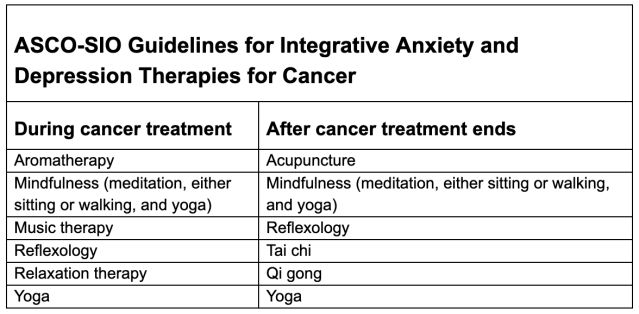Integrative Medicine
When Cancer Makes You Anxious, Take an Alternative Approach
Some integrative health treatments can help during and after cancer treatment.
Posted February 8, 2024 Reviewed by Michelle Quirk
Key points
- Anxiety and depression are common in people with cancer, their family members, and caregivers.
- Integrative approaches include mindfulness-based stress reduction and mindfulness-based cognitive therapy.
- Meditation and some yoga practices qualify as mindfulness-based stress reduction.

“But does it work?”
You’ve probably asked that question when a friend or neighbor told you about something new they were doing to feel better.
When it comes to integrative health care for people with cancer experiencing anxiety and depression, we can now give a qualified “yes.” Two highly regarded medical organizations, the American Society for Clinical Oncology (ASCO) and the Society for Integrative Oncology (SIO) recently completed a joint evaluation of integrative approaches to anxiety and depression relief and published new guidelines. Guidelines are based on a summary of the latest evidence and should be what healthcare practitioners follow when treating their patients.
The cancer connection with anxiety and depression
Anxiety and depression are common in people with cancer, their family members, and caregivers. As the ASCO and SIO guidelines note, adults diagnosed with cancer report higher stress levels than those without cancer. The most stressful times appear to be around the time of diagnosis and at the start of treatment.
Support—don’t replace—regular cancer care
Today, many cancer centers and hospitals offer some integrative care, such as yoga classes for women healing from breast cancer. But which integrative health approaches help anxiety? Which are better for depression? And is there a difference in when you try them or what they can help?
Again, it appears that the answer is yes, though, as always, we need more research to fully explore the benefits of integrative approaches.
According to the ASCO-SIO guidelines, the specific approaches below have been shown to help anxiety and depression during and after treatment. It’s important to note that these findings only reflect what we know at the moment. These are not hard-and-fast never-to-be-broken rules, and they are certainly not intended to put pressure on you or your loved one to try specific approaches.
Speak with your healthcare provider to work together and decide what integrative therapy appeals to you.

Digging into the details
A few specifics to keep in mind about the guidelines: First, most of the research on yoga was done with people who had breast cancer. So far, we don’t know quite as much about how yoga helps people with other types of cancer.
Mindful … what?
If you read the guidelines themselves, you will probably notice that the strongest evidence of benefit is for something called “mindfulness-based interventions.” So, what are those? Mindfulness means something like “be where you are.” According to mindfulness expert Jon Kabat-Zinn, mindfulness is “paying attention in a particular way, on purpose, in the present moment, and nonjudgmentally.”
For example, if you’re sitting on your front porch, you can practice mindfulness by clearing your mind of to-do lists and worries, putting down your phone, and focusing on what’s around you at that moment: the sound of the breeze, the temperature of the air, the iced tea you’re sipping, and the street life or nature right in front of you. Don’t think about dinner, or work, or your next chemotherapy treatment—just be.
Specific integrative approaches include mindfulness-based stress reduction and mindfulness-based cognitive therapy. These approaches help you stay in the moment, just like you did on your front porch a second ago. Meditation and some yoga practices qualify as mindfulness-based stress reduction.
Does integrative health have to be spiritual?
No, and that’s OK, too. Many mindfulness-based approaches do have roots in specific world religions; yoga is based on Hindu spiritual practice, for example. If a particular practice is contrary to your belief system, or you want to avoid anything that smacks of the supernatural, don’t despair; you will likely reap similar benefits from a similar practice—Pilates-based stretching instead of yoga, for example, or meditating on an inspiring quote if you prefer not to “empty your mind.”
There are also many integrative approaches, such as reflexology and music therapy, that can be done without a spiritual aspect or tailored to your taste. Does everyone love the scent of lavender … except you? Another aromatherapy oil might be your go-to choice for stress reduction. While specific practices have been studied, this does not mean you should feel obligated to practice them exactly as people in a research study did.
Where can I find guideline-recommended integrative care?
Ask your doctor or someone else on your cancer care team. If you are receiving cancer care at a major center, integrative approaches may be readily available. You may also find care in your community or through an organization such as Cancer Support Community. Yoga, meditation classes, acupuncture, and even treatments such as reflexology, a form of massage focused on the feet, are now available even in many small communities.
Of course, don’t overlook the power of the internet. Cognitive behavioral therapy with a mindfulness approach can be accessed through an online therapist.
Finally, if you belong to a support group for people with cancer, family members, or caregivers, word of mouth can be a great way to find integrative cancer care—and learn what has helped others.
References
Resources to learn more
Information on anxiety, depression, and distress, with tips on how to tell what you are experiencing and how to manage feelings:
American Cancer Society: Emotional and mental health and mood changes
Read the guidelines from ASCO and SIO, which could be shared with your doctor or health care provider:
American Society for Clinical Oncology guidelines: https://old-prod.asco.org/practice-patients/guidelines/patient-and-survivor-care
Society for Integrative Oncology and ASCO joint guidelines on anxiety and depression: https://ascopubs.org/doi/full/10.1200/JCO.23.00857
How to talk with your doctor about trying integrative health approaches:
American Cancer Society: How Do I Talk to My Doctor About Complementary and Integrative Methods?




